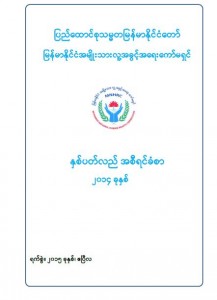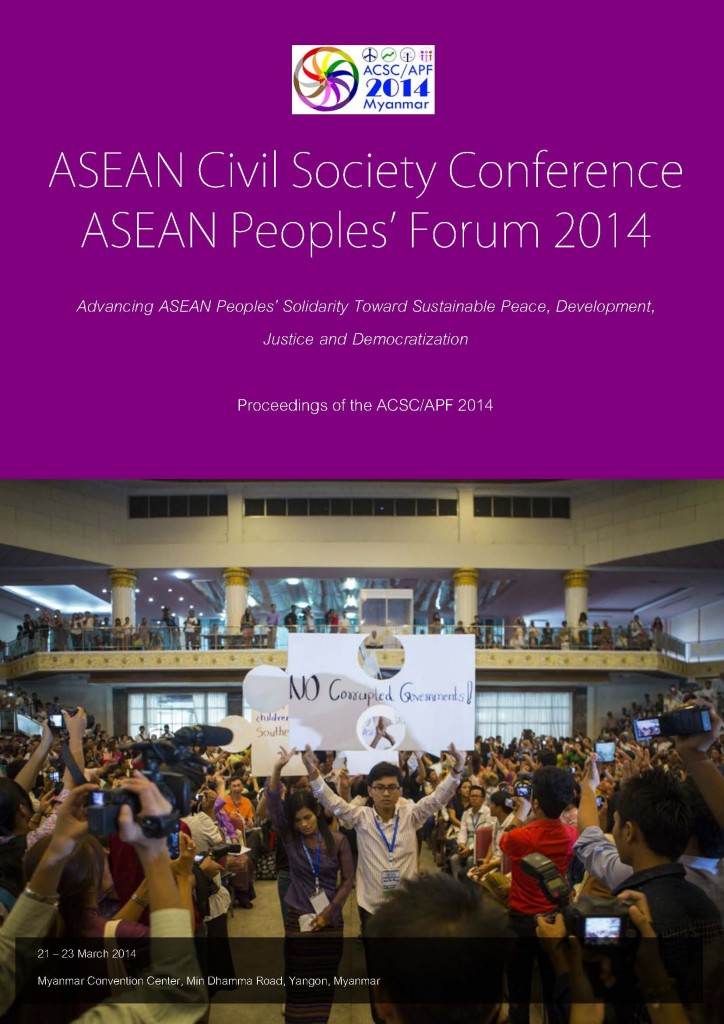ASEAN (150 found)
Caught Between State Censorship and Self-Censorship: Prosecution and Intimidation of Media Workers in Myanmar
 Myanmar’s media landscape has seen a radical change since the country embarked on a series of important political, economic and social reforms, announced by President Thein Sein in March 2011. The lifting of pre-publication censorship, the release of imprisoned journalists and greater space for freedom of expression have seen the development of an increasingly vibrant and diverse media. These media reforms have been lauded by many in the international community, who are keen to point to increased media freedoms as one of the hallmarks – and successes – of Myanmar’s reform process […]
Myanmar’s media landscape has seen a radical change since the country embarked on a series of important political, economic and social reforms, announced by President Thein Sein in March 2011. The lifting of pre-publication censorship, the release of imprisoned journalists and greater space for freedom of expression have seen the development of an increasingly vibrant and diverse media. These media reforms have been lauded by many in the international community, who are keen to point to increased media freedoms as one of the hallmarks – and successes – of Myanmar’s reform process […]
Thematic Briefing: Armed conflict in Paletwa, southern Chin State
[Chiang Mai, Thailand] The Chin Human Rights Organization (CHRO) today condemned both the Arakan Army (AA) and the Burma Army for human rights abuses and violations of international humanitarian law, in the context of recent outbreaks of conflict between the two sides in Paletwa, southern Chin State […]
• • •To Recognize and Repair: Unofficial Truth Projects and the Need for Justice in Burma
 The advance towards a free and democratic Burma has so far done little to account for the crimes of its past. Emerging from a military dictatorship and opening its doors to the outside world has certainly led to an increased focus from the international community on the future of the country. As a result of increased scrutiny by the outside world, the U Thein Sein government has repeatedly reiterated their genuine commitment to improving the human rights situation. Despite government statements to the contrary, the situation for human rights defenders, journalists, farmers, land rights activists and civilians particularly in ethnic areas – has not improved […]
The advance towards a free and democratic Burma has so far done little to account for the crimes of its past. Emerging from a military dictatorship and opening its doors to the outside world has certainly led to an increased focus from the international community on the future of the country. As a result of increased scrutiny by the outside world, the U Thein Sein government has repeatedly reiterated their genuine commitment to improving the human rights situation. Despite government statements to the contrary, the situation for human rights defenders, journalists, farmers, land rights activists and civilians particularly in ethnic areas – has not improved […]
Anti-Muslim Activities in Burma
This report prepared based on the information received from a Burma based monitoring network. The report mainly focused on the activities of anti Muslim Buddhist extremist groups and anti Muslim political parties such as Race and Faith Defence League (RFDL), Myanmar National Network (MNN), Peace and Diversity Party (PDP) and other incidents that effect minority Muslims in Burma.
Race and Faith Defence League is also known as Ma Ba Tha in Burmese acronym. Among these organisations and parties, RFDL is the largest organisation, which has a nation wide network, hierarchically structured, functioned by the monks, and supported by government. This is the organisation that proposed four discriminative laws – marriage law, birth control law, religious conversion law and polygamy law that President Thein Sein and the Parliament approving without hesitation. So far, the organisation has about 30000 members across Burma and a very strong network in grassroots level. Its members are available at every town, village, and streets […]
Malaysia: Discovery of Mass Graves a Call to Action
Suara Rakyat Malaysia (SUARAM) is extremely saddened by the heart-wrenching discovery of a mass grave of some 100 Rohingya in Perlis. We hope that the Malaysian government will now treat this issue with the seriousness it deserves and ensure an impartial and independent investigation is conducted. We note that there have been reports relating to the existence of such camps and holding houses in Malaysia for some time; we would urge the impartial and independent investigation to include the question of why apparently so little was done to act on these reports until now […]
• • •Statement by Cardinal Charles Bo on the ‘Boat People’ – for Compassion and Mercy
An agony of immense poignancy unfolds on the seas of South East Asia. A new wave of boat people, ejected by excruciating poverty and conflict from both Myanmar and Bangladesh are adrift in the seas. Exploited by unscruplous human traffickers, men, women and children are huddled in unhealthy, sqaulor ships, often sent to die in the seas. South East Asian seas have a wounded history of gulping down hundreds during the Vietnam conflict. A new wound opens up. Now a new saga of tears and shatteredness filles our consciousness everyday[…]
• • •ျမန္မာႏိုင္ငံအမ်ိဳးသားလူ႔အခြင့္အေရးေကာ္မရွင္: ႏွစ္ပတ္လည္ အစီရင္ခံစာ ( ၂၀၁၄)
ျပည္ေထာင္စုသမၼတ ျမန္မာႏိုင္ငံေတာ္၊ ျပည္ေထာင္စု အစုိးရအဖဲြ႔သည္ ဖဲြ႔စည္းပုံအေျခခံဥပေဒပါ ႏိုင္ငံသားမ်ား၏ မူလအခြင့္အေရးမ်ားကို ျမွင့္တင္ေရးႏွင့္ ကာကြယ္ေစာင့္ေရွာက္ေရးတုိ႔အား ေဆာင္ရြက္ႏုိင္ရန္အလုိ႔ငွာ ၂၀၁၁ခုႏွစ္၊ စက္တင္ဘာလ (၅) ရက္ေန႔တြင္ အမိန္႔ေၾကာ္ျငာစာ အမွတ္ ( ၃၄/၂၀၁၁) ျဖင့္ ျမန္မာႏိုင္ငံ အမ်ိဳးသား လူ႔အခြင့္အေရး ေကာ္မရွင္ကုိ အဖြဲ႔၀င္ ( ၁၅) ဦးျဖင့္ ဖဲြ႔စည္းျပီး တာ၀န္ႏွင့္လုပ္ပုိင္ခြင့္မ်ား သတ္မွတ္ထုတ္ျပန္ခဲ့ပါသည္ […]
၂၀၁၁ခုႏွစ္၊ စက္တင္ဘာလ (၅) ရက္ေန႔တြင္ အမိန္႔ေၾကာ္ျငာစာ အမွတ္ ( ၃၄/၂၀၁၁) ျဖင့္ ျမန္မာႏိုင္ငံ အမ်ိဳးသား လူ႔အခြင့္အေရး ေကာ္မရွင္ကုိ အဖြဲ႔၀င္ ( ၁၅) ဦးျဖင့္ ဖဲြ႔စည္းျပီး တာ၀န္ႏွင့္လုပ္ပုိင္ခြင့္မ်ား သတ္မွတ္ထုတ္ျပန္ခဲ့ပါသည္ […]
Reclaiming the ASEAN Community for The People – CSO Statement
1. PREAMBLE
1.1 This ASEAN Civil Society Conference and ASEAN People’s Forum marks the 10th anniversary since the first regional gathering of civil society in Malaysia. We, the civil society in Southeast Asia[1], welcome the commitment of ASEAN in the years since to establish a people-centric ASEAN and a peaceful, prosperous community. With deep regret and concern, the people’s recommendations submitted to ASEAN member states since 2005 have been neither implemented nor adopted in any meaningful way […]
• • •ACSC/APF 2014 Post Conference Report
As a member of the Association of Southeast Asian Nations (ASEAN), Myanmar accepted the gavel that symbolizes the ASEAN presidency. This was a historic moment since this is the first time Myanmar has taken the Chair since it became a member of ASEAN. As Chair, Myanmar is responsible for hosting many important regional forums and events during 2014.
The ASEAN Civil Society Conference (ACSC), also known as the ASEAN Peoples’ Forum (APF), is held independently by the ASEAN Chair country in advance of, and parallel to, the official ASEAN Summit, which is attended by ASEAN and regional leaders. The first ACSC/APF took place in Malaysia in 2005. Since then it has taken place in the Philippines (2006), Singapore (2007), Thailand (2009), Vietnam (2010), Indonesia (2011), Cambodia (2012), Brunei (2013) and this year in Myanmar (2014). The 10th ACSC/APF took place on 21 – 23 March 2014 at the Myanmar Convention Center in Yangon, Myanmar.
• • •People of ASEAN Stand Up To Be Counted
The ASEAN Civil Society Conference / ASEAN People’s Forum (ACSC/APF) 2014, held in Yangon, Myanmar, on 21-23 March, and coorganised by long-standing Myanmar advocates to ASEAN, namely Burma Partnership, Task Force on ASEAN and Burma, and Women’s League of Burma, together with 80 other civil society organizations (CSOs) and community based organizations (CBOs),can be hailed […]
•

 All posts
All posts